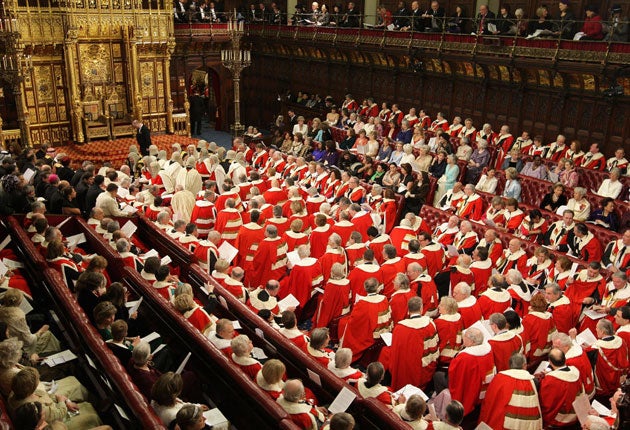Peers line up to block House of Lords reforms
Only 9 per cent would support plan for fully elected second chamber

Your support helps us to tell the story
From reproductive rights to climate change to Big Tech, The Independent is on the ground when the story is developing. Whether it's investigating the financials of Elon Musk's pro-Trump PAC or producing our latest documentary, 'The A Word', which shines a light on the American women fighting for reproductive rights, we know how important it is to parse out the facts from the messaging.
At such a critical moment in US history, we need reporters on the ground. Your donation allows us to keep sending journalists to speak to both sides of the story.
The Independent is trusted by Americans across the entire political spectrum. And unlike many other quality news outlets, we choose not to lock Americans out of our reporting and analysis with paywalls. We believe quality journalism should be available to everyone, paid for by those who can afford it.
Your support makes all the difference.Plans to turn the House of Lords into an elected chamber could be blocked by overwhelming opposition among peers, research for The Independent has revealed.
A ComRes poll of 100 peers shows a growing acceptance that constitutional reform is inevitable following the parliamentary expenses scandal. But the survey also shows there is little appetite for an elected second chamber of Parliament.
Both Labour and the Tories are expected to fight the general election on a pledge to bring in a largely elected Lords, but the survey suggests that road-blocking peers would fight tooth and nail to preserve their positions.
Sixty-three per cent of peers back the status quo and want the House to be entirely appointed, as it is at present. Only 9 per cent say the Lords should be fully elected, according to the representative cross-party sample. Just 18 per cent of those surveyed backed a partially elected and partially appointed chamber. Two per cent of the peers said the Lords should be abolished completely.
Some limited changes to the Lords will be included in a Constitutional Reform Bill to be unveiled today by the Justice Secretary, Jack Straw. For the first time, life peers will be able to resign their seats, while those who break the rules or commit criminal offences punishable with a year in jail could be expelled. At present, they can only be suspended. The 92 remaining hereditary peers would literally die out under the Bill. At present, when a member of the House of Lords dies, a by-election takes place among the hereditary peers who in 1999 lost their 700-year-old right to sit and vote in the House.
Later this year, the Government will publish a separate Bill to reform the composition of the Lords. The measure includes a proposal for either an 80 or 100 per cent elected second chamber. But it will have no chance of becoming law before the general election, leaving whoever forms the next government to pick up the mantle of reform.
While an elected Lords has risen up the political agenda following the expenses controversy, the ComRes findings highlight how difficult it would be to persuade members of the upper house to pass the necessary legislation. Although Labour or the Tories could use the Parliament Act, which allows the Commons to override the Lords, senior figures in both parties admit that they might shy away from a two-year pitched battle with peers and shelve plans for an elected Lords.
The expenses claimed by peers as well as MPs have been the subject of great controversy over the past few months and 63 per cent of those surveyed in the ComRes poll admitted they thought that peers would be viewed more negatively as a result of the revelations. Twenty-four per cent disagreed.
However a clear majority – 75 per cent – of peers thought that public anger with politicians was based on dissatisfaction about wider issues rather than expenses. Eighteen per cent disagreed.
According to the poll, a minority – 35 per cent – of peers believe that constitutional reform should be one of the top items on the political agenda, while 60 per cent do not. Only 3 per cent favour any form of Lords reform.
Some 68 per cent of peers think people should be appointed to the Lords for their expertise rather than for party-political reasons, while 25 per cent disagree.
Meanwhile, 42 per cent back the independent oversight of parliamentary pay and expenses. Thirty-three per cent support more powers for select committees and 16 per cent want MPs elected by proportional representation.
Fifty-four per cent of peers agree that religious representation in the Lords should reflect the religious make-up of the country as a whole, while 23 per cent disagree.
Join our commenting forum
Join thought-provoking conversations, follow other Independent readers and see their replies
0Comments